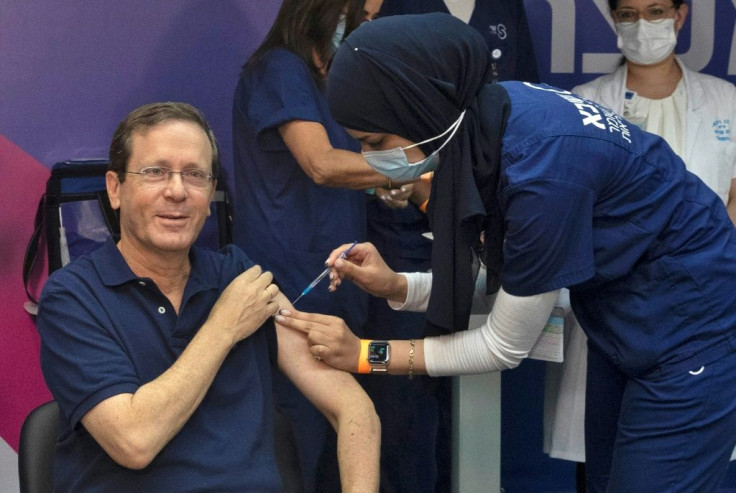Israel Launches Covid Booster Shot Campaign For Over 60s
Israel launched a campaign Friday to give the elderly Covid-19 booster shots, at a time when the rest of the world is still struggling to complete the standard course.
Kicking off the campaign, Israel's President Isaac Herzog, 60, received a third dose of the Pfizer/BioNTech Covid-19 vaccine at a hospital in Ramat Gan, near Tel Aviv.
"We are beginning the booster vaccination" so that life in Israel can return to "normal" as soon as possible, Herzog said after getting the injection.
"With this new step of the Israeli government... I believe that it's also a lesson to the entire humankind that we have to protect each other and take the necessary steps."
Israel was quick to roll out its vaccination campaign and had dropped many restrictions on public gatherings in June, but infections soared, and masks are once again mandatory in enclosed public places.
About 55 percent of its nine million population has been double vaccinated, most with the Pfizer-BioNTech jab, thanks to a massive campaign launched in late December after an agreement with its developers.
Israel's digitised medical databases allowed for rapid large-scale studies, and its initial vaccine rollout of the jab was among the world's fastest.
Prime Minister Naftali Bennett announced the start of the booster campaign for over 60s on Thursday, as concern mounts over the fast-spreading Delta variant of the coronavirus.
"Israel is a pioneer in going ahead with third doses for people of the age of 60 and above," said the 49-year-old premier who accompanied Herzog to the hospital for the jab.
"The fight against the Covid pandemic is a global fight. The only way we can defeat Covid is together," he said.

"Together means sharing information, together means sharing methods, technologies, insights and actionable steps," said Bennett.
"Israel is open to share all the information that we can gain from this bold move. We can win together."
Israel had already authorised in mid-July the administration of a third dose of vaccine for people with severe immunosuppression, since their immune system made them vulnerable to the virus.
Pfizer, which produces the vaccine used in Israel, has said research shows that a third dose has neutralising effects against the Delta variant of Covid.
But the US Food and Drug Administration, whose recommendations Israel generally follows, has yet to give the green light to administering a third dose to the elderly.
Israel recorded more than 1,400 Covid-19 cases in the 24 hours to Thursday.
More than 15,000 active cases were identified, including 151 people hospitalised in a serious condition, according to the health ministry.
Case numbers dropped dramatically, and in early June Israel eased many restrictions.
But infections soon rose again, prompting the health ministry to reimpose the wearing of masks in enclosed public places.
Last month, health officials announced they would open up vaccination to children as young as 12, while earlier this week, they said those aged five to 11 at risk of serious health complications could be vaccinated from August 1.
© Copyright AFP 2024. All rights reserved.











